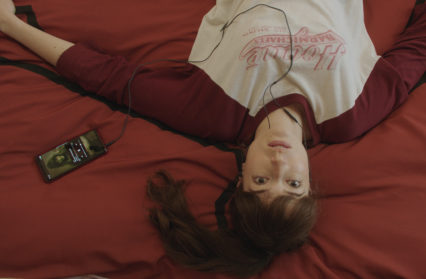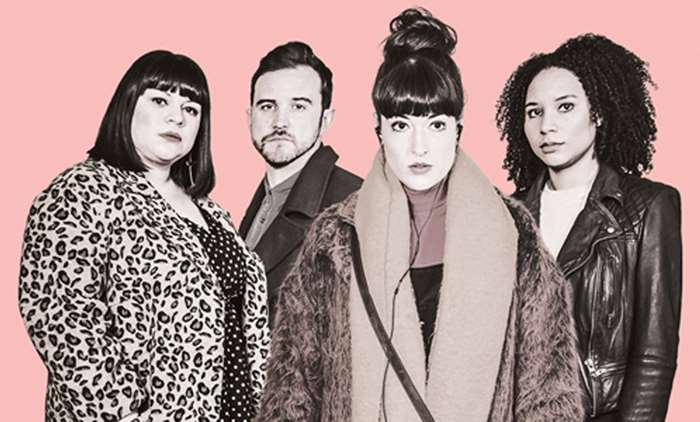Gary Raymond on Hanna Jarman and Mari Beard’s comedy drama, Merched Parchus, S4C’s first straight to streaming production.
Merched Parchus has been billed by S4C as the programme to lead their ‘digital revolution’, and it is a show that aches with the desire to be embraced by the millennial audience that is currently spinning commissioning execs on their heels. For all of its charm, the shortfalls of Merched Parchus are rooted in the patchwork sewing of trends into a lopsided, undercooked comedy-drama that bristles with the underlying talent of its creators. It is a show that may, given a chance to grow into its own thing, become a delight, because there is, as it is, much to recommend it. But Merched Parchus is less than the sum of its parts, a good concept with engaging characters and an eye for a set-piece, dished out in unsatisfying 13-minute web-only episodes that flit between Fleabag-esque sophistication and student film naivety. It is packed to the rafters with Welsh-language talent, from Cate le Bon writing her first screen score, to the litany of actors, but all seem still stuck in development mode. Merched Parchus feels a like a draft that’s got potential.
Hanna Jarman and Mari Beard write and star (the press releases explains one hails from Cardiff and other from Aberystwyth, as if we are to expected to praise the Welsh language broadcaster as if they have managed to bring together Shia and Sunni for a Nativity play). Jarman takes centre stage as Carys Williams, the twenty-something trying to find her way in life after an unexpected break-up. She is also currently obsessed with a true crime podcast, narrative elements of which begin to bleed into her actual everyday life. It’s a neat concept, although not fully exploited. Jarman and Beard have a bit of fun with the idea, but they could be having a lot more. A protagonist who struggles to keep daydreams from invading reality is a trope that goes back further even than Billy Liar, and although there is a snappy, satisfying tendency to shock with the swift sliced throat of a “media wanker” (the Pontcanna crowd get a well-deserved contemptuous send up), this fails to really build to anything worthwhile. There is a smart, subtle moment, when Carys, on her first day teaching in a high school, flicks on her podcast whilst eating her lunchtime sandwiches in a toilet cubicle, and the narrator’s American drawl begins an episode on school mass shootings.
But scenes of genuine smartness like this are balanced out with unconvincing interactions, such as when Carys has a call from a “health advisor” to tell her she needs to come in for a conversation about some test results. The suspicion of a lack of real rigour when it comes to finalising the craft becomes more and more pervasive as Merched Parchus goes on.
Elsewhere, Jarman is a strong presence, and she treads confidently that line the audience need to teeter on between sympathy and disapproval. And you cannot deny Jarman and Beard know this world of the Welsh language middle class, and have the eye to skewer it at will, as well as treat it with affection. The set-piece scene where a friend from university launches his book, a history of the A470, will be excruciatingly familiar to all in the Welsh arts firmament. The mediocrity of the entitled white male that is endemic in much of the Welsh arts scene has been begging for a parody for as long as I can remember, and here is a decent stab at it. But what Merched Parchus seems unable to realise is that by giving Catrin Beard, for example, (Mari Beard’s mother in real life), an inconsequential reverential cameo here, it undermines all attempts to call out the self-aggrandising and uncritical culture of the Welsh creative industries. It’s difficult to take the piss out of the bubble if you are, one hundred per cent, the bubble.
But Merched Parchus doesn’t simply live or die on its takes on the incestuous cliques of Welsh media. Its real successes come form the well-drawn central character of Carys. The bilingualism of the script is very pleasing, too, and suggests that perhaps the future of Welsh performance (if you also take into account the parallel shifts in Welsh theatre) lies in this naturalist weaving of two languages, rather than the either/or that has been the status quo for so long.
But few people will come away from Merched Parchus able to shake the temptation to compare it to Fleabag, Pheobe Waller-Bridge’s hugely successful and influential BBC drama that recently drew to a close. Merched Parchus wears its love for that show like corduroy dungarees with a Breton stripe tee, but it might have taken some deeper lessons. Fleabag was under development for the unforgiving live arena for years before it was snapped up by the BBC for television, and had gone through various scriptwriting programmes and had toured and paid its dues at the Edinburgh Fringe as a one woman show. Without doubt, Waller-Bridge had no shortage of people telling her which bits were not good enough. Consequently, Fleabag is a lean, sharp, intelligent, athletic piece of work that by the time it reached television had been carved into a thing of profound excellence. Merched Parchus is green, and carries with it the distinct aroma of a BBC commissioner who has read in a report that Fleabag and true crime podcasts are what millennials are into, and has sent a memo to the bubble. There’s a great deal of talent here, but all of it is in need of more development, more focus, and much more discipline.
Merched Parchus is available now on Clic and the BBC iPlayer.
You might also like…
With more and more people turning towards online services to provide entertainment as the order to ‘stay at home’ persists in Wales, Caragh Medlicott considers the impact streaming giant Netflix’s reliance on algorithmic data has on creativity in the film and television industry.
Gary Raymond is a novelist, broadcaster, and editor of Wales Arts Review.




 Enjoyed this article? Support our writers directly by buying them a coffee and clicking this link.
Enjoyed this article? Support our writers directly by buying them a coffee and clicking this link.








